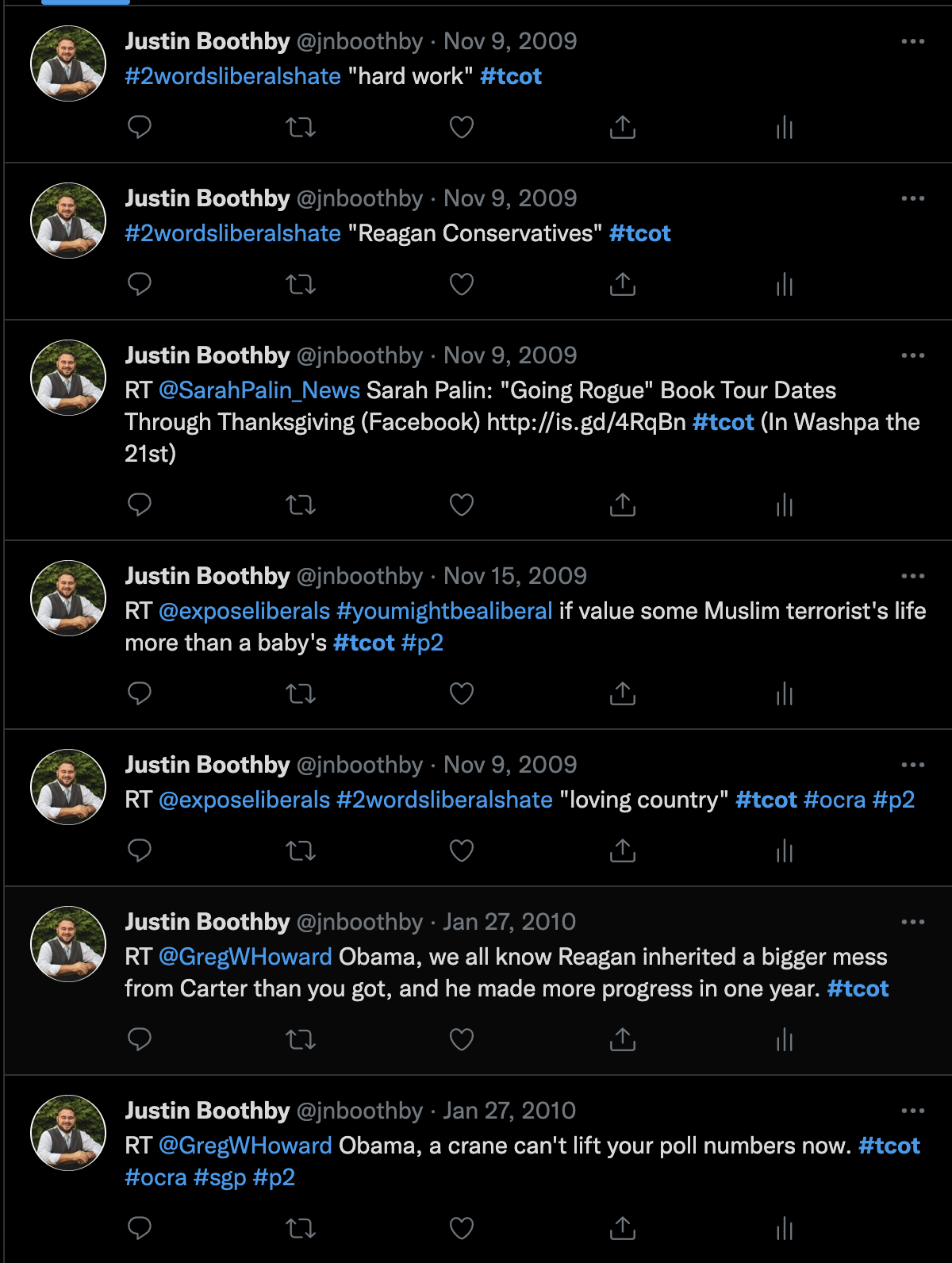Political Identity: From Deconstruction To Reimagination

POLITICAL IDENTITY: FROM DECONSTRUCTION TO REIMAGINATION
Deconstruction began for me on November 4, 2008 – the night Barack Obama won the presidency. After years of being a staunch Republican Conservative, going to the many rallies for George W. Bush, and then John McCain and Sarah Palin (I was even called out as “Justin the Student” at Sarah Palin’s rally and have the picture with her to prove it), things began to shift. I remember thinking that night, “Obama isn’t my King. Jesus is my King.” Of course, those thoughts were more out of spite than honest beliefs about Jesus. Still, it was that very thought that commenced my deconstruction journey.

LOOK AT THOSE SIDEBURNS!


[INSERTS CRINGE-WORTHY TWEETS]
Now let’s be fair, this isn’t just on the Republican side. It’s on the Democrat side too, and ultimately any side that places political candidates and elected officials in a place with more power than YHWH. You listen to your “daily sermons” from your favorite political talk show host. You get your “daily scripture” from your favorite news station. You follow your favorite preachers — both spiritual and political preachers on social media who only say things you agree with. They may claim to be using their power to follow Jesus or “obey Jesus’ teachings” (and there may be a very select few who do), but really they are just using Jesus to get your votes, views, engagement, and ultimately their power.
Let’s go down a rabbit hole for just a minute here. I grew up thinking if I say, “Oh my god!” I’m taking “the LORD’s name in vain.” Now sure, saying “Jesus Christ” as a slur or “God damn it” while not actually asking God to damn something is misusing the LORD’s name (though technically, the prohibition is about YHWH and not “God” or “Jesus” but I’ll save that for another discussion). However, using YHWH in a way that renders the name powerless and even further, using YHWH’s name to get what you want without actually consulting the LORD is just as blasphemous as saying, “YHWH damn it!” If anyone uses the name of YHWH (and for our purposes, Jesus as well) to justify their sinful behavior or oppression of other people, THAT is using the LORD’s name in vain and completely misusing it. While we probably shouldn’t say the name of YHWH in any way that’s not honoring, we should absolutely be careful in how we use The Name in our daily actions and behaviors.
And so as my deconstruction journey began with my political identity, I began noticing how politicians would use the name of Jesus, but not actually live as Jesus commanded. Over the course of the next 4 years from late 2008 to 2012, I realized how poorly I had been living and how many times I mistreated others simply because my identity was found in American Conservatism rather than Jesus of Nazareth. I was the person who would say, “This is America! Speak English!” I believed that legislating morality was the best way to bring the Kingdom to earth. And the saddest part is that I believed the Kingdom was America.
I don’t know if there was an actual “aha” moment for me. I think it was a gradual process that occurred over several years. And so with each moment of realizing the horrible ways in which Jesus was being used by my political party to gain power, another piece of drywall and another stud wall came tumbling down in my house of faith. I began realizing how brainwashed and indoctrinated I was when certain words would trigger me like “social justice.” Why was that a trigger? Well because I spent years being indoctrinated to believe it was evil and that I should attack anyone who used it to justify their actions.
What really hit me was when I began thinking about the Revolutionary War and our founders with Romans 13 in view. I’ll save that topic for another time, but it made me truly question whether I believed America was founded on Jesus or “Christian principles.” And with that, my entire room of American idolatry was torn down.
Reimagining Our Political Identity In Jesus
So how do we reimagine our political identity once it’s been deconstructed? First, we need to look at how Jesus spoke to the political arena of his time and how He expected his followers to participate in the unavoidable structure of politics. Of course, we know that the political dynamic of first-century Judea was an entirely foreign concept to American politics. No voting, no representatives, but as the sun rises and sets they still had taxes, greed, and tyranny.
When we look at the life and teachings of Jesus, we see very little content when it came to Jesus getting involved in politics. In fact, one could argue that Jesus refused to get involved in the politics of his day. Jesus wasn’t interested in politics, He was interested in the Kingdom and how His followers would bring the Kingdom to earth when He was gone. To be fair, Jesus did not live in a political structure like the United States or many Western countries with democracy. Be that as it may, there are a few places we can gain insight into Jesus’ thoughts on Kingdom politics.
“Give Unto Caesar What Is Caesar’s”
We’ve heard this quote a lot, but this would almost be considered blasphemy among many in America today (and no doubt, in their day too). Let’s look at Matthew 22:16-22 in context.
But Jesus, knowing their evil intent, said, “You hypocrites, why are you trying to trap me? Show me the coin used for paying the tax.” They brought him a denarius, and he asked them, “Whose image is this? And whose inscription?”
“Caesar’s,” they replied.
Then he said to them, “So give back to Caesar what is Caesar’s, and to God what is God’s.”
When they heard this, they were amazed. So they left him and went away.”
No one likes paying taxes and trust me, in Jesus’ day, taxes were even worse than they are today. Nevertheless, when Jesus was confronted on paying taxes – one of the few moments we see Jesus speak to the political issues of his day, Jesus said, “Give to Caesar what is Caesar’s, and give to God what is God’s.” In other words, we are citizens of this world and the political milieu in which we live. We have a responsibility to give back to our city and country – even if it is corrupt (and make no mistake, it will always be corrupt). And on the same ‘token’ we have a responsibility to our eternal residence of citizenship with God. Whether it’s tithing, using our gifts to glorify God, or by sacrificing our lives for the Kingdom, we have a responsibility to give to God what is God’s because we acknowledge that everything we have comes from him – even the country we reside.
There is not one nation that is truly a Christian nation. No nation is truly a theocracy. Neither America nor Israel are theocracies today. Both are secular states run by people who have no obligation to seek the counsel of YHWH in making their decisions. There will always be corruption. There will always be greed. There will always be people who abuse their power to oppress others and gain riches for themselves. And this is where my deconstruction journey led when it came to political issues. I had to divorce myself from the American Agenda so that I could be on the Kingdom’s Agenda. I realized that every nation, yes, even the ancient nation of Israel, became corrupt. So much of what we read in the Hebrew Bible, especially the prophets, are polemical warnings to turn back to YHWH because the people abused their political power. My loyalty to YHWH must be at the center of how I live and behave, and out of that love and obedience to YHWH my responsibility to my neighbors and country flows.
As Jesus-followers and citizens of the Kingdom, it is our collective responsibility to care for our neighbors. To care for the needy, the orphans, the widows, the grieving, the hurting. Whether we are elected officials or not, we have a responsibility to our country, not to legislate what we believe is the hottest moral cause of the year, but to do our best to ensure that the people who have the least and are hurting the most have people in their lives who use the name of Jesus to love their neighbors as themselves.
My Kingdom Is Not Of This World
Once again, Jesus almost never spoke to the political issues of His day because His Kingdom was not of this world. And in the reimagination of our faith, we must keep that in mind. In fact, there are occasions where the people tried to push Jesus into becoming king and take over the government. In first-century Judea, the people believed that the Messiah was to be a military ruler who would overthrow the Roman government and establish an earthly kingdom. I contend elsewhere that this was Judas Iscariot’s belief as well and the very reason why he betrayed Jesus.
In John 6:14-15 it says, “After the people saw the sign Jesus performed, they began to say, “Surely this is the Prophet who is to come into the world.” Jesus, knowing that they intended to come and make him king by force, withdrew again to a mountain by himself.”
When we think about the temptation of Jesus (even though those pericopes are in completely different Gospels, they are no less important) we can understand why Jesus needed to go through that initial temptation. Jesus wasn’t only tempted to become an earthly king. Jesus would be tempted all throughout his ministry to begin His reign without going to the Cross – even by His own disciples. John 6 was certainly one of those interactions.
Another instance was at Caesarea Philippi where Jesus predicts his death and Peter essentially scolds Him for it. Peter, like Judas and the rest of first-century Judea, wanted a military messiah. Rome was corrupt and evil so, of course, they wanted the tyranny to end. But Jesus retaliates by calling Peter Satan — yes, the same person He just blessed and gave the new name Peter (Petros=rock – originally Simon). And this is where the reimagination of our political identity begins taking shape. Right after Jesus calls Peter the name Satan, Jesus looks at everyone else and says, “Whoever wants to be my disciple must deny themselves and take up their cross and follow me.” What is Jesus saying here? Whoever wants to be His disciple must crucify themselves, yes, but also crucify their own ideas about who they want Jesus to be.
As mentioned earlier, oftentimes people use the name of YHWH or Jesus for their own political or selfish purposes. Likewise, how often do people follow their own god they make up in their minds? They use out-of-context bible verses to justify their actions and make Jesus or YHWH who they want them to be, rather than who they really are. Our political identity must be found in Jesus of Nazareth, not Jesus of Washington, D.C.
“Lord, when did we see you hungry or thirsty or a stranger…”
Before I conclude this article, I think it’s fitting to end with Jesus’ final words in the Olivet Discourse (Matt. 24-25). Within the final pericope of Matthew 25, Jesus prophesied his return and the coming judgment that will ensue with His return. So what does this have to do with our political identity? It has everything to do with our political identity.
In Matthew’s Gospel, one of the final teachings Jesus gives is the Olivet Discourse, and the final parable is the sheep and the goats when “the Son of Man comes in his glory, and all the angels with him.” At what we consider will be the final judgment, the thing Jesus will care more about is how you brought the Kingdom to earth – how you fed the hungry, gave drink to the thirsty, invited in the stranger, clothing those who need clothing, and visited those who are in prison. Gospel politics isn’t about whose party is doing the best for the country, it’s about who’s using what they’ve been given to help and serve “the least of these.” Serving “the least of these” is synonymous with serving Jesus according to the Matthew 25:31-46.
I would love to get into the whole voting and party side of this, but it’s beyond the scope of this article and this is already running close to 2,500 words. I’m not going to tell you how to vote. I’m not going to prophesy the next President of the United States. I am, however, going to ask you to crucify your own thoughts about how a Jesus-follower should be involved in politics. I used to think Jesus was a Republican and it was my duty as a Christian to live out the Republican values because I believed they were Christian values. Many may believe that Jesus is a Democrat or would vote for a Democrat and that they embody the values of Jesus the most. But there are questions we must ask in our deconstruction journey. What did Jesus care about the most and what did He truly focus on? Did Jesus really spend His time complaining about Caesar and the corrupt Roman government while finding ways to overthrow his leadership? Of course not. The Kingdom was at hand and there was work to be done for the souls of people, not the governments of the world.
Conclusion
When we deconstruct our faith at the political level, we will almost always find out there is an idol hiding in the closet or behind the drywall. We have a responsibility to destroy that idol. One of the best ways to deconstruct our political idolatry is to ask the hard questions and let them penetrate our souls. Is my king Jesus or is it my political champion? Is my allegiance to Jesus and the Kingdom or is it to America (or insert any country here) – Matthew 6:24? Are my political ideals really in line with Jesus of Nazareth, or are they more in line with people who claim to be representing Jesus?
Jesus wasn’t interested in healing the Roman government – even though He could have. No – Jesus was interested in healing people. The best way to change a nation isn’t through making new laws or offering a new government program (though they can help when done right). The best way to change a nation is to heal the hearts of people. And we can’t heal the hearts of people if we’re only concerned with commenting hatefully on someone’s post who doesn’t agree with our favorite politician or news reporter. We must be in the midst of the people both serving them and offering them the life-changing truth that comes from Jesus The Messiah. The Gospel of Jesus is both something to be preached and something to be lived out. We cannot follow Jesus and only do one or the other. In reimagining our faith at the political level, we must follow Jesus’ example and be concerned with healing people, not governments.
מרנאתא/Maranatha
-Justin
Leave A Comment
I’d love to hear your thoughts on this article! Please remember to be kind and respectful. If you didn’t like something, I always welcome constructive criticism. However, any form of hatred, bullying, or racism will not be tolerated.

About The Author
Justin Boothby is a lifelong student who loves to travel, film, write, design websites, and life coach. Most importantly he loves to Pastor in all different kinds of ministry settings. He’s also an avid pizza lover, metalcore listener, and shot glass collector.
Join me in my latest Lectio Divina session.
Recent Blog Posts

Cutting Off Bad Fruit
Realizing we need to make changes to our lives isn’t easy. In fact, it’s downright hard! But Jesus calls us to do it to remain in Him.

I Surrender Some: How To Practically Trust God
Many of us have sang “I Surrender All” but do we really mean it? Trusting God isn’t easy but it can be practical.

3 Ways To Become An Empathetic Servant-Leader
If you want to become an empathetic servant-leader you have to sit out of your comfort zone and challenge yourself to serve other people.

Busyness: Oh Busy, Busy Bees
Busyness has become one of the true adversaries of America. How do we combat this enemy and reclaim our lives?
About The Author

Justin is a lifelong student who loves to speak, travel, film, write, and coach. He has a goal of empowering others to grow closer to Jesus in practical and unique ways. After acquiring two degrees in Practical Theology and then studying in Israel for two years, Justin has a passion to help people read the Bible with a deeper appreciation in its original, ancient context.
M.A. Hebrew University of Jerusalem
M.Div. Regent University
B.S. Southeastern University



